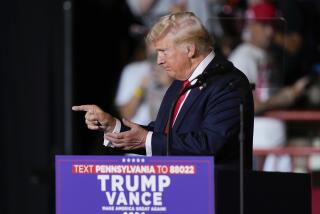Making a Case to Lift Simpson Trial Gag Order
- Share via
Even if Superior Court Judge Hiroshi Fujisaki turns out to be tougher than Lance Ito in controlling a courtroom, don’t bet on him succeeding in putting the clamps on the O.J. Simpson wrongful death trial.
The judge has barred cameras from the courtroom during the trial, which begins Tuesday, and issued a broad gag order banning lawyers, the plaintiffs, Simpson and witnesses from talking to the media.
Obviously, the judge hopes he can turn it into just another civil suit, rather than having an encore of that infamous circus known as the Simpson murder trial. “History will repeat itself unless the court acts to prevent it,” Fujisaki said when he issued the order.
Whether he succeeds remains to be seen. Even though this trial is a civil matter, without the threat of jail that lies at the end of criminal proceedings, public interest remains strong, judging from book sales and the continued fascination of ratings-minded TV shows.
*
We’re reminded why by two books--”The Run of His Life: The People v. O.J. Simpson” by Jeffery Toobin and “Beyond O.J.: Race, Sex and Class in America” by Earl Ofari Hutchinson.
Toobin, who covered the trial for the New Yorker, recounted how the lawyers for both sides played to the world outside the courtroom. “The participants in the Simpson case worked obsessively to influence press coverage,” Toobin wrote. “These efforts to shape the news--some successful, some not--had important and lasting consequences from the night of the murders to the morning of the verdict.”
And afterward. The media battle continued, fueled by Johnnie L. Cochran Jr., Robert Shapiro, Christopher Darden and other participants who turned their attention from Simpson to the task of self-aggrandizement and book selling. “The passing months,” wrote Toobin, “did not so much heal the wounds in race relations as witness the growth of an ugly scar.”
Los Angeles writer Hutchinson, a Simpson trial television pundit, discusses why the case resonated so far and so long, why it touched such sensitive chords among whites and blacks.
Hutchinson, who is African American, concluded that “it defied credulity to believe that the LAPD had the resources, skill or even the motive to frame O.J. . . . But that wasn’t the point. Many blacks thought the police could and did.”
The case also dug deeply into feelings about interracial marriage, Hutchinson wrote, and domestic abuse. “O.J. propelled the issue of spousal abuse and domestic violence from bedroom privacy to public outrage,” he said.
*
Many, many people have a deep and emotional concern about these issues. They are matters argued over in bars and clubs, over dining tables and in office cafeterias. Families are split by them, friendships broken.
Judge Fujisaki may think he think he can limit the arguments to his courtroom, but he does not understand the out-of-control dynamics of today’s communications business.
Nobody’s going to keep the tabloids down, either the supermarket variety or the television shows. Sure, witnesses, lawyers and others will be silenced by their orders. But the tabloids will be scurrying through L.A. with checkbooks, paying friends, neighbors, co-workers and others for their version of the inside story.
The public will be overloaded with bum information. I can see it now: “O.J. Witness’ Secret Love Nest.”
Once in the tabloids, stories quickly make their way into the mainstream press. America’s most staid newspapers opened up their front pages when the Star reported that Clinton advisor Dick Morris had shared confidences with his prostitute girlfriend.
The Simpson case reaches far deeper into the American psyche than the Morris-hooker story. It forces discussion of subjects we would prefer to ignore--racism, spousal abuse, police misbehavior and the weaknesses of the courts.
This is too big to be confined to the narrow boundaries of a Santa Monica courtroom. It will be discussed all over town, all over the country. But discussions will be based on slanted leaks, inaccurate rumors and paid revelations. No doubt, some of this will seep into the courtroom.
The gag orders and media restrictions will backfire. That’s why they should be lifted.
More to Read
Sign up for our Book Club newsletter
Get the latest news, events and more from the Los Angeles Times Book Club, and help us get L.A. reading and talking.
You may occasionally receive promotional content from the Los Angeles Times.










